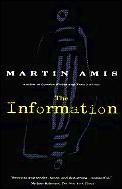 This book review was originally published on Critics’ Choice on August 3, 1995.
This book review was originally published on Critics’ Choice on August 3, 1995.
It would be an admirable move for somebody to write a review of this novel without mentioning the soap opera-ish circumstances behind its publication — most notably, Amis’s demand for a higher advance, his abandonment of literary agent Pat Kavanaugh (wife of fellow British novelist Julian Barnes) for American “jackal” Andrew Wylie, and the exorbitant amount of money he subsequently spent on a new set of teeth.
Unfortunately, it’s impossible.
Because Martin Amis’s The Information is a novel that’s glibly self-conscious about the entire literary publication process, and bitter as horseradish about it, too. It’s a novel that’s sure to offend, horrify, and amuse anyone that’s ever indulged in writing, book reviewing, editing, or publishing. On top of all that, The Information has the gall to be — well, somewhat boring.
The Information explores a topic that today’s civilized practitioners of the literary arts are supposed to be well above: jealousy. Specifically, the jealousy that one lettered novelist, Richard Tull, feels for his best friend Gwyn Barry, who has written a dismal piece of politically correct pap and became fabulously rich because of it. Richard’s simmering hatred inspires him at first to play practical tricks on Gwyn; “harmless” pranks like seducing his wife or paying a poolhall thug to rough him up. Gradually Richard becomes an erupting volcano of rage, a literary Iago intent on ruining Gwyn’s reputation and, if possible, having him killed.
Fueling Richard’s fury is the wretched state of his own career. Once a reputable author, Richard now survives by reviewing interminable biographies on dead and largely forgotten subjects (such as The Mercutio of Lincoln’s Inn Fields: A Life of Thomas Betterton and AntiLatitudinarian: The Heretical Career of Francis Atterbury). He works for a little magazine called, appropriately, The Little Magazine. And his unfinished novel Untitled, which features a scene where five unreliable narrators have a conversation over crossed cellular phone lines while all walking through the same revolving door — got that? — gives everyone who dares to read it a crushing migraine headache.
Gwyn, in the meantime, has become the biggest literary sensation since Charles Dickens on the strength of a book about a dozen people (one from each racial/ethnic group) stranded on an island where there is no war and no love.
Those who have read Amis’s previous works (among them Dead Babies, London Fields, and Time’s Arrow) know the sort of concentrated viciousness the author can unleash. And in this respect The Information doesn’t disappoint, taking us on a guided tour through the bars and alleyways of England where characters named Scozzie and Crash nurse on the breast of violence and intimidation; and then to the moneyed estates of the rich and famous, who engage in the same activities and call it culture.
Unfortunately, there’s a bit of Richard Tull hidden away somewhere inside Martin Amis. His novel can make you cackle with vicious glee on one page and then bore you to tears with a pretentious dissertation on the pointlessness of human endeavors the next. He takes his characters to task for their unendurable solipsism, but he pads The Information with long strings of narrative bombast written in the first person. Intentional? Possibly, but that doesn’t make it the more enjoyable or insightful.
With all the confusion (both media-imposed, and self-imposed) surrounding The Information, it’s difficult to give the book an objective judgment. Those who read it will take home some precious insight and low comedy; those who don’t might be skipping a headache or two of their own.
How easy life can be… I have just read The Information during a long night in which, like a typical reader of Tull’s novel Untitled, I spat a mouthful of blood every twenty minutes. At five o’clock in the morning I finished the book full of contradictory feelings, and called for an ambulance. I have successfully been operated on in some Hick’s hospital (Frantic search for injection-needles, etc.) and have slept for four fruitful hours. Well, I must say I easily (glibly? naturally?) endorse the opinion of Mr Edelman. I’m great at having mixed feelings, and always enjoyed them, but not this time. I may have risked death by reading on till the end, but – together with numerous thumbnail markings wherever I intend(ed) plagiarizing Mr Amis – I must also confess reading this book has been a gruelling experience. My Problem was: Why? Wording it proved to be too forceul a mental task. So I googled up The Information and lo and behold, Edelman deftly (the man does have a wide vocabulary, which he handles wit natural ease) worded everything for me!
Of course I will read other books by Mr Amis, who has just provided me with some 30 passages, sentences and word combinations smoothly insertable in my 540 p. novel called ‘Roman-Die-Nooit-Afkomt’ (Never-Ending-Novel), already published, but being made fatter and fatter by the same procédé, till it reaches 1300 pp.
Kind regards to everybody
Wouter Noordewier
Don’t quite agree with your review, not your understanding of the novel. I think you missed the point of the “narrative bombasts.” It is, in fact, during one of these bombasts, that their purpose is explored.